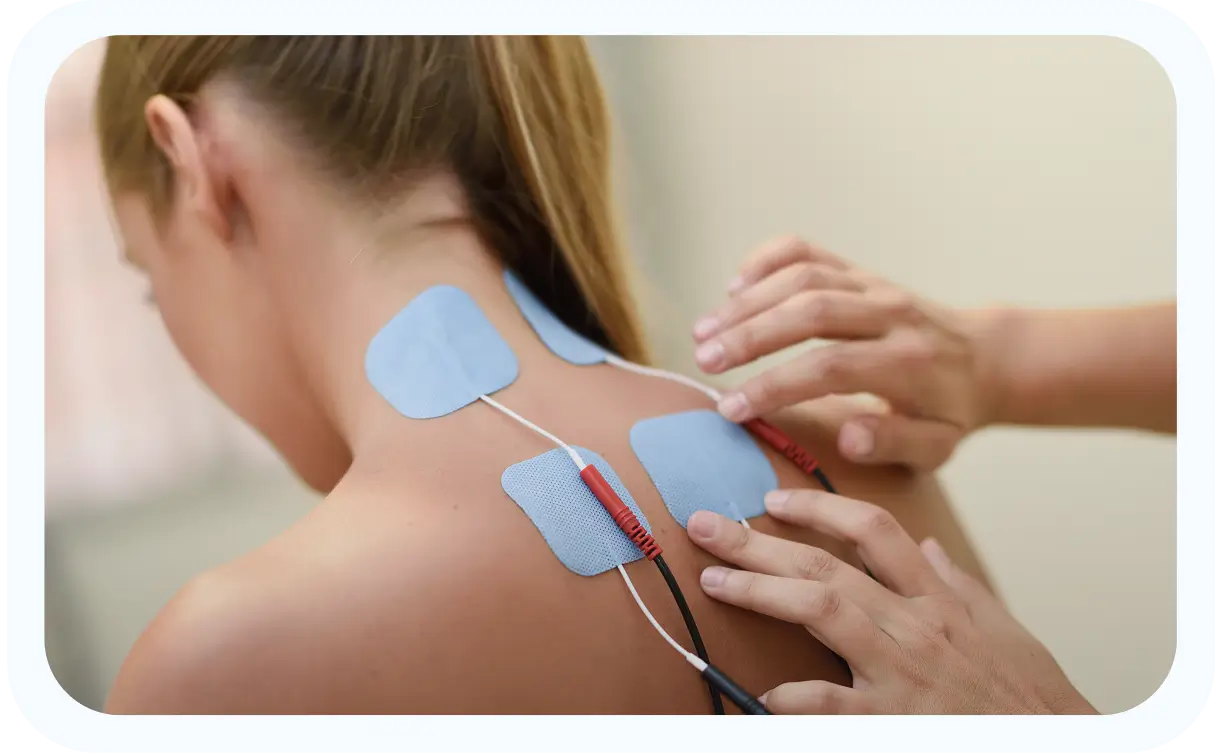At-home tools to calm pain and allow higher-quality practice of movement. We specify device, pad placement, and safety so you can actually use it well.
Flares that derail training, neuropathic discomfort, or post-op sensitivity. If focal inflammation dominates, Injections & Ablations may accelerate progress.

TENS helps regulate pain signals and reduce discomfort.
NMES supports muscle engagement when natural activation is limited.
Electrical stimulation is paired with specific exercises for carryover.

Treatments are short and easy to integrate into routine.

Usage follows simple rules for safety and effectiveness.

If stimulation improves reps and range, we continue; if not, we stop.
Request Your Same-Day TENS & Home Electrical Stimulation Evaluation
Don’t wait in pain — our expert spine specialists are available for same-day evaluations.
Transcutaneous Electrical Nerve Stimulation (TENS) and neuromuscular electrical stimulation (NMES) are at-home tools designed to calm pain and support muscle activation. They’re used to reduce discomfort and help you move more effectively during therapy. We provide detailed guidance on device use, pad placement, and safety. Learn more about our Non-Surgical Treatments.
Patients experiencing pain flare-ups, neuropathic discomfort, or post-operative sensitivity often benefit from electrical stimulation. It can help restore comfort and control between therapy sessions. When inflammation is more localized, other options such as Injections & Ablations may accelerate recovery. The goal is to maintain consistent progress and minimize setbacks during your rehabilitation plan.
TENS helps modulate pain signals (nociception), while NMES promotes muscle activation when inhibition or weakness is present. Together, they improve pain tolerance and movement quality. These sessions are combined with guided drills to build strength and coordination. Learn how this supports recovery alongside Physical Therapy progressions.
TENS and NMES sessions are short and structured, with clear rules for duration and intensity. We help you monitor your response—if stimulation improves movement and reduces pain, it remains part of care. If it doesn’t help, the plan is adjusted quickly. For more on adaptive treatment approaches, explore Non-Surgical Care.
No. These tools are designed as temporary bridges that enable better physical training and rehabilitation. As your therapy capacity improves, we taper their use. If pain continues despite proper use, we re-evaluate with Injections & Ablations or adjust your diagnosis. The goal is long-term independence, not dependence on devices.
Electrical stimulation complements your non-surgical care plan by easing pain so you can engage more effectively in movement-based rehab. It’s one piece of a broader strategy focused on restoring function, mobility, and confidence. Once stability improves, active exercise replaces device use. Learn about our full approach under Non-Surgical Treatments.
Contact us and set up your doctor visit today to start your journey to pain-free living